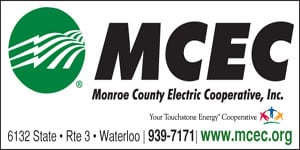Waterloo School Board plans for late tax revenue
The Waterloo School Board discussed what actions it needs to due to the lateness of property tax revenue at its October meeting on Monday.
The discussions began with Superintendent Brian Charron explaining that tax levy laws require the district to certify a levy for the coming year by the fourth Tuesday in December.
In order for that to take place at the December board meeting, the district must first approve a tentative levy at least 20 days before the final one is certified. That must be done by the November board meeting.
Charron said the district usually completes the task early by doing it in October.
It cannot do that this year, however, because it still does not know how much money it will get from property taxes since the property tax assessments were completed late.
“We cannot do it this year in October because when we adopt the levy, we have to identify it, legally, as a percentage of the prior year’s levy,” Charron explained. “But we in Monroe County still do not know what is extended for the 2017 tax year. Therefore, we cannot prepare the tentative levy.”
The tax levy is the amount of money a school district requests from property taxes.
Charron said he contacted Monroe County Clerk Dennis Knobloch, who assured him that within two to three weeks his office would be able to certify what the tax extension is so the district can meet its deadlines.
The taxes were at the state level awaiting a final multiplier because the property taxes were under-assessed. That final multiplier of 1.0180 was announced Tuesday.
Charron said that announcement means the district should get the information it needs on time.
Even so, Charron said the delay was worth noting.
“I want the public to know that we are not able to do normal business that we do,” he said.
As a contingency, Charron also spoke to the district’s attorney to see what action the district would need to take if it did not have the extensions in time.
The attorney conferred with other lawyers in his firm, who said they had never encountered this issue before. The firm said its legal opinion was the district would not be able to file a tax levy without knowing the extension.
“This is kind of unprecedented,” Charron said. “For our school law firm, which serves I don’t know how many hundred districts in Illinois, to say they’ve never had this question is revealing to the current state of affairs that we have. My intent is not to blame any certain individual for this, but it is to highlight that this is costing taxpayer dollars because it has not been on time.”
The exact cost to taxpayers became clearer as the school board adopted resolutions to deal with the lack of property tax funding.
It loaned $1 million from the working cash to the educational fund. It also loaned $900,000 from the working cash fund to the debt service fund.
“In order to not go in the negative in the ed fund and debt service fund, we are needing, for the month of October, to borrow from working cash the funds to get by,” Charron summarized.
The board also authorized the issuance of $6 million in tax anticipation warrants.
Those are a type of loan the district gets using the taxes it will receive as collateral.
That $6 million figure will be borrowed from First National Bank of Waterloo in $2 million increments as needed in November, December and January.
The district will not incur a penalty if it does not borrow the money for each of those months, which it will most likely not have to since the multiplier was announced.
Charron said the annualized interest on that loan is 3.75 percent, but since the district is only borrowing for a quarter of a year the interest rate will be a quarter of that.
The interest will still cost taxpayers almost $20,000 a month.
“It’s unfortunate that taxpayers’ money has to be spent this way,” board member Gary Most said to Charron. “Thank you very much for monitoring this and being proactive. It’s a shame you have to spend your time to make up for that for what’s not getting done at the county level.”
Charron also said this alternative was less financially damaging than cashing out some investments and forfeiting the interest on them. That was the case, in part, because some of those investments would then have to be sold.
“We would be selling investments on the market and it would be subject to whatever somebody else wants to pay for them,” Charron said. “So we would not know what our loss would end up being, and I did not like that uncertainty of just going to the market with our investments when the duration of our need is short term.”
In other business, the school board authorized Charron to enter into a contract agreement with PlaygroundEquipment.com for $46,040.
That will purchase a playground for Gardner Elementary School and cover the costs of the installation.
That cost is higher than what the district initially estimated because it decided it would be better to pay to have professionals install the playground than have its employees do it.
It made that decision because of liability concerns given the number of children on the equipment at one time and the fact that district employees do not install playgrounds professionally.
“This is not a knock on our people,” Charron stressed. The company said it can assemble the playground in three days, much faster than the district could have installed it.








